-
NoticeMeal Care Social V...
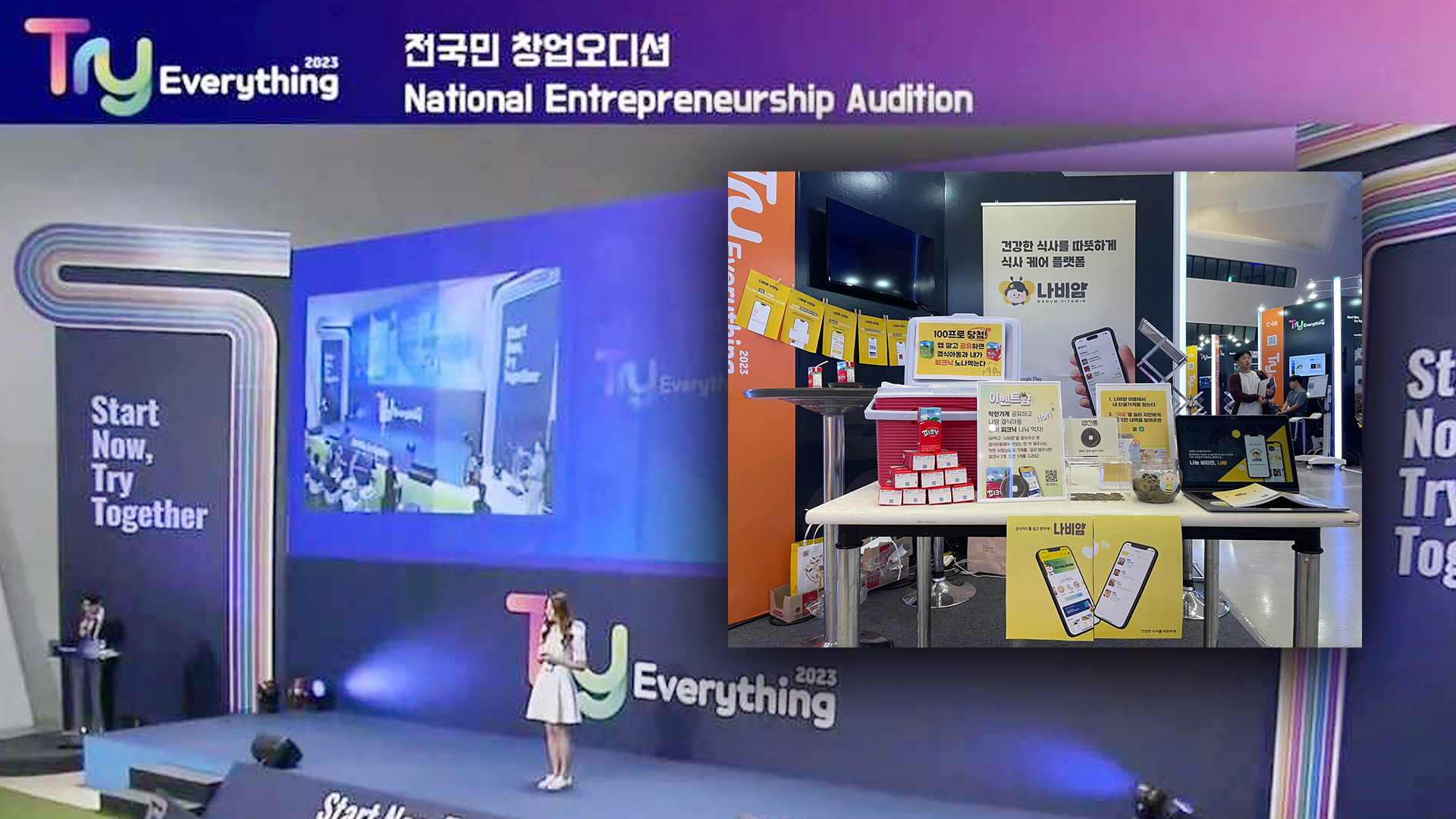 Meal care social venture "Nanum Vitamin" participated in "Try Everything 2023," the largest global startup event in the second half of the year, which runs for three days from September 13.
Try Everything is a startup event hosted by the Seoul–si Government and SBA, with 1,500 startups and 150 domestic and foreign investment companies and corporate officials under the theme of "Global, Investment, and Accompany." From September 13th (Wednesday) to 15th (Friday), the company introduction booths of promising startups were operated, and on the last day, a national startup audition demo day was held.
Nanum Vitamin participated in "NextRise," which was the largest startup event in the first half of the year, also participated in try-everything to promote its meal care platform "Naviyam." From September 13, the company introduction booth was operated for three days, receiving collaboration proposals from various investment accelerators and corporate officials, and introducing companies and platforms. In addition, it was selected and announced on the final demo day of the national start-up audition held on September 15.
In the corporate introduction booth, while sharing the store in the "Naviyam" service and it operated a "1 for 1" event in which both underfed children and participants receive drinks.
In She Demo Day announcement, the business model was explained by referring to the user participatory meal card merchant data purification function, the good influence store meal sharing reservation function, and the parent-child joint prepaid charging function to be introduced in the future.
Kim Ha-yeon, CEO of Nanum Vitamin, said, "I want to grow into a meal care platform so that parents do not worry about their children's meals." We look forward to cooperation with various organizations so that everyone can keep a healthy meal warm," she said.
Meanwhile, Nanum Vitamin recently won the Digital Innovator Award as the winning team in the Women in Entrepreneurship program of SC Bank.
Meal care social venture "Nanum Vitamin" participated in "Try Everything 2023," the largest global startup event in the second half of the year, which runs for three days from September 13.
Try Everything is a startup event hosted by the Seoul–si Government and SBA, with 1,500 startups and 150 domestic and foreign investment companies and corporate officials under the theme of "Global, Investment, and Accompany." From September 13th (Wednesday) to 15th (Friday), the company introduction booths of promising startups were operated, and on the last day, a national startup audition demo day was held.
Nanum Vitamin participated in "NextRise," which was the largest startup event in the first half of the year, also participated in try-everything to promote its meal care platform "Naviyam." From September 13, the company introduction booth was operated for three days, receiving collaboration proposals from various investment accelerators and corporate officials, and introducing companies and platforms. In addition, it was selected and announced on the final demo day of the national start-up audition held on September 15.
In the corporate introduction booth, while sharing the store in the "Naviyam" service and it operated a "1 for 1" event in which both underfed children and participants receive drinks.
In She Demo Day announcement, the business model was explained by referring to the user participatory meal card merchant data purification function, the good influence store meal sharing reservation function, and the parent-child joint prepaid charging function to be introduced in the future.
Kim Ha-yeon, CEO of Nanum Vitamin, said, "I want to grow into a meal care platform so that parents do not worry about their children's meals." We look forward to cooperation with various organizations so that everyone can keep a healthy meal warm," she said.
Meanwhile, Nanum Vitamin recently won the Digital Innovator Award as the winning team in the Women in Entrepreneurship program of SC Bank. -
NoticeSeoul National Uni...
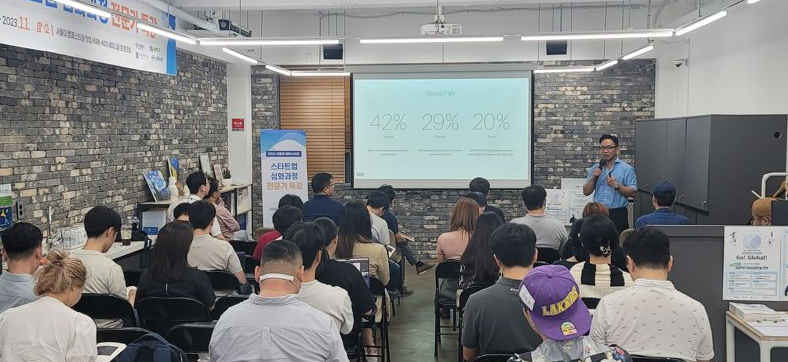 As a necessary condition for Korea's high-tech start-ups to grow into global unicorn companies, it was suggested that timely investment, sales, and government support programs should be used as prerequisites for successful settlement along with entering the U.S. market."The most important strategy to enter the U.S. market is to use investment, sales, and government support programs together in a timely manner," said Yongbum Kim, head of The Livingston Group's strategy department, in a special lecture by experts on "successful U.S. market entry strategy" in the process of deepening campus town startups at Seoul National University on the 16th.The Livingstone Group is a lobbyist group headquartered in Washington, D.C., that lobbies the U.S. House and Senate for client companies and countries, links between governments, international relations and business development, general public relations advice, and strategic marketing. In particular, it is helping to benefit from U.S. federal and state loans, subsidies, and incentives by utilizing a long-standing network of experts in politics and business, led by former U.S. House Speaker.Seoul National University explained that The Livingstone Group was selected by Bloomberg as "one of the best performing lobbying companies in 2022."
In a lecture, Kim explained why the startup Asian market has been relatively good since the COVID-19 pandemic, but the U.S. venture fund situation fell 27% in the previous quarter, forcing the overall global trend to fall, citing an example of a company."The U.S. market has more opportunities than Korea, and the market is already formed, so it is necessary for startups to enter the U.S. market in order to do global scale-up," he said. "Most of the top rankings of cities with global clusters of startups around the world are in the U.S."
Asked in which cities in the U.S. are likely to succeed, Mayor Kim advised, "Even top cities (in the U.S.) cannot succeed unconditionally, and more importantly, it is important to understand what infrastructure and characteristics each city has.""One strategy is to start in a city with a well-established infrastructure in consideration of the characteristics of each industry that we want to start a business, and the best area to enter is where customers are, so it has to be different for each company," he added.
He cited market research as a necessity to attract investment in the U.S.
"In order to attract successful investment in the United States, It need to understand the difference between the market (domestic vs. the United States) , trying to enter and also understand the perspective of U.S. investors," Kim pointed out."Among the various reasons why startups fail, the biggest percentage is 'launching products that the market does not want (42%)', followed by a lack of funds (29%), and a team (20%).In addition, he stressed that Pitch Deck, which can attract investors' attention, is also an important factor, and ordered, "An interesting Pitch Deck that can lead to the next meeting for investors should contain only key elements and have a conclusion to the solution by accurately identifying the problems in the market." Pitch Deck refers to promotional explanatory materials to attract investment.
Kim defined sales as the most difficult area and said, "The reason why sales are difficult first time, it takes a long lead time. In addition, sales vary from industry to industry, and sales techniques must vary depending on the environment in which the company is located, he said."The sales process is almost the same as meeting investors, but it's also different," he pointed out, and advised, "It's advantageous to always have a local manager so that he can come out right away when I say, 'I'll bring the director, let's talk over a cup of coffee.'"Head of the department Kim stressed that government programs are important for fair competition with companies in the U.S. "The U.S. is one of the most funded places in the world, and because there are so many government support programs and various programs between ministries, Korean companies should also be supported for competition in the U.S."The special lecture was held at the invitation of the Seoul National University Campus Town Project Group for Gwanak S Valley, companies in Seoul National University Campus Town, and members of Seoul National University.
Kim Tae-wan, head of the campus town business at Seoul National University, said, "We will provide better special lectures in the future so that many outstanding companies can come out of Gwanak-gu," adding, "The future goal and dream is that companies that have grown through the support of the campus town project group will be produced as unicorn companies by 2026."
As a necessary condition for Korea's high-tech start-ups to grow into global unicorn companies, it was suggested that timely investment, sales, and government support programs should be used as prerequisites for successful settlement along with entering the U.S. market."The most important strategy to enter the U.S. market is to use investment, sales, and government support programs together in a timely manner," said Yongbum Kim, head of The Livingston Group's strategy department, in a special lecture by experts on "successful U.S. market entry strategy" in the process of deepening campus town startups at Seoul National University on the 16th.The Livingstone Group is a lobbyist group headquartered in Washington, D.C., that lobbies the U.S. House and Senate for client companies and countries, links between governments, international relations and business development, general public relations advice, and strategic marketing. In particular, it is helping to benefit from U.S. federal and state loans, subsidies, and incentives by utilizing a long-standing network of experts in politics and business, led by former U.S. House Speaker.Seoul National University explained that The Livingstone Group was selected by Bloomberg as "one of the best performing lobbying companies in 2022."
In a lecture, Kim explained why the startup Asian market has been relatively good since the COVID-19 pandemic, but the U.S. venture fund situation fell 27% in the previous quarter, forcing the overall global trend to fall, citing an example of a company."The U.S. market has more opportunities than Korea, and the market is already formed, so it is necessary for startups to enter the U.S. market in order to do global scale-up," he said. "Most of the top rankings of cities with global clusters of startups around the world are in the U.S."
Asked in which cities in the U.S. are likely to succeed, Mayor Kim advised, "Even top cities (in the U.S.) cannot succeed unconditionally, and more importantly, it is important to understand what infrastructure and characteristics each city has.""One strategy is to start in a city with a well-established infrastructure in consideration of the characteristics of each industry that we want to start a business, and the best area to enter is where customers are, so it has to be different for each company," he added.
He cited market research as a necessity to attract investment in the U.S.
"In order to attract successful investment in the United States, It need to understand the difference between the market (domestic vs. the United States) , trying to enter and also understand the perspective of U.S. investors," Kim pointed out."Among the various reasons why startups fail, the biggest percentage is 'launching products that the market does not want (42%)', followed by a lack of funds (29%), and a team (20%).In addition, he stressed that Pitch Deck, which can attract investors' attention, is also an important factor, and ordered, "An interesting Pitch Deck that can lead to the next meeting for investors should contain only key elements and have a conclusion to the solution by accurately identifying the problems in the market." Pitch Deck refers to promotional explanatory materials to attract investment.
Kim defined sales as the most difficult area and said, "The reason why sales are difficult first time, it takes a long lead time. In addition, sales vary from industry to industry, and sales techniques must vary depending on the environment in which the company is located, he said."The sales process is almost the same as meeting investors, but it's also different," he pointed out, and advised, "It's advantageous to always have a local manager so that he can come out right away when I say, 'I'll bring the director, let's talk over a cup of coffee.'"Head of the department Kim stressed that government programs are important for fair competition with companies in the U.S. "The U.S. is one of the most funded places in the world, and because there are so many government support programs and various programs between ministries, Korean companies should also be supported for competition in the U.S."The special lecture was held at the invitation of the Seoul National University Campus Town Project Group for Gwanak S Valley, companies in Seoul National University Campus Town, and members of Seoul National University.
Kim Tae-wan, head of the campus town business at Seoul National University, said, "We will provide better special lectures in the future so that many outstanding companies can come out of Gwanak-gu," adding, "The future goal and dream is that companies that have grown through the support of the campus town project group will be produced as unicorn companies by 2026." -
NoticeMetafarmers Reveal...
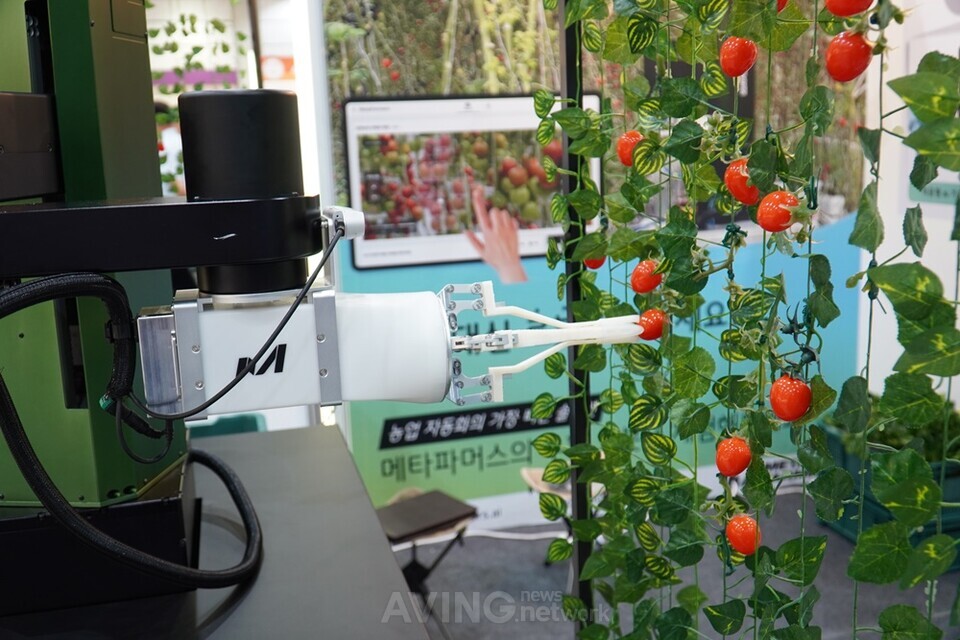 Metagfarmers (CEO Lee Kyu-hwa) participated in the Agricultural Food Tech Startup Fair (AFRO 2023) held at COEX A Hall for three days from July 26 (Wed) to 28 (Fri).
Metafarmers is a company that revolutionizes agriculture with artificial intelligence and robotics. As smart farms and artificial intelligence-related technologies develop, monitoring and optimizing crop growth information continues to be advanced. Nevertheless, Metafarmers explains that replacing the hard work of agriculture in indoor greenhouses with automation has yet to form a market due to a complex environment. Metafarmers aims to replace this barrier with artificial intelligence and robotics technology.
The exhibition introduced Metafarmer, a tomato harvesting robot for greenhouses, and TabFarmers, an artificial intelligence software that can remotely control it to teach robots. Metafarmers consist of a four-axis robot and an end effector capable of harvesting tomatoes without damage on a mobile base that can be moved in a greenhouse. A web application called Tap Farmers, which can remotely control this, allows robots to issue commands remotely about what crops and how to harvest them. Along with greenhouse crops such as tomatoes, strawberries, paprika, eggplants, and cucumbers, the harvest can be ordered, and the automation rate increases as they are used.
An official from Metafarmers said, "To solve the labor shortage in rural areas, many global companies are developing automatic harvest robots using artificial intelligence technology. However, no company has succeeded in commercializing it yet. Artificial intelligence and robotics technologies are not mature enough to overcome complex agricultural environments, he said. "We want to solve these problems with technologies that can transfer robot remote control and know-how." Rather than the robot automatically harvesting, it was determined that a person intervened in the middle and ordered and supervised agricultural work would be a better approach in this agricultural environment," he explained.
He also revealed the background of his participation in the exhibition. An official said, "We want to receive seed investment by introducing the products and methodologies we are developing to VCs, and seek business strategies through networking with various agri-start-ups.
Metagfarmers (CEO Lee Kyu-hwa) participated in the Agricultural Food Tech Startup Fair (AFRO 2023) held at COEX A Hall for three days from July 26 (Wed) to 28 (Fri).
Metafarmers is a company that revolutionizes agriculture with artificial intelligence and robotics. As smart farms and artificial intelligence-related technologies develop, monitoring and optimizing crop growth information continues to be advanced. Nevertheless, Metafarmers explains that replacing the hard work of agriculture in indoor greenhouses with automation has yet to form a market due to a complex environment. Metafarmers aims to replace this barrier with artificial intelligence and robotics technology.
The exhibition introduced Metafarmer, a tomato harvesting robot for greenhouses, and TabFarmers, an artificial intelligence software that can remotely control it to teach robots. Metafarmers consist of a four-axis robot and an end effector capable of harvesting tomatoes without damage on a mobile base that can be moved in a greenhouse. A web application called Tap Farmers, which can remotely control this, allows robots to issue commands remotely about what crops and how to harvest them. Along with greenhouse crops such as tomatoes, strawberries, paprika, eggplants, and cucumbers, the harvest can be ordered, and the automation rate increases as they are used.
An official from Metafarmers said, "To solve the labor shortage in rural areas, many global companies are developing automatic harvest robots using artificial intelligence technology. However, no company has succeeded in commercializing it yet. Artificial intelligence and robotics technologies are not mature enough to overcome complex agricultural environments, he said. "We want to solve these problems with technologies that can transfer robot remote control and know-how." Rather than the robot automatically harvesting, it was determined that a person intervened in the middle and ordered and supervised agricultural work would be a better approach in this agricultural environment," he explained.
He also revealed the background of his participation in the exhibition. An official said, "We want to receive seed investment by introducing the products and methodologies we are developing to VCs, and seek business strategies through networking with various agri-start-ups.
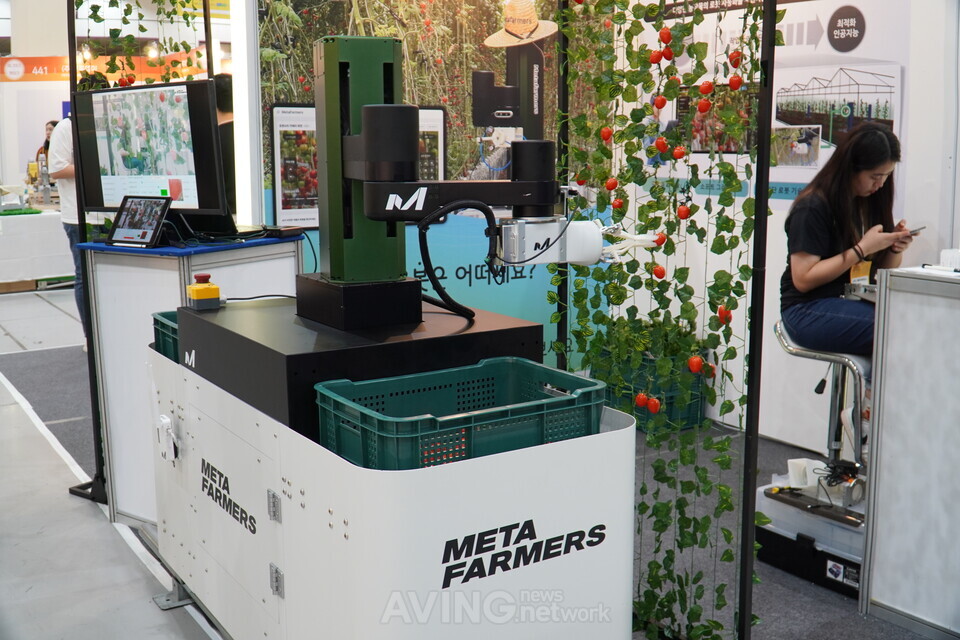 In the future, Metafarmers plans to launch services for the five major greenhouse crops. Early next year, the company plans to provide a subscription service for harvesting robots for tomatoes and strawberries, and plans to expand to eggplants, cucumbers, and paprika in the future. In addition, additional transport robots connected to harvest robots and crop monitoring services are scheduled to be released.
The official went on to say, "Metafarmers replace harvests, but in the future they will replace the early seeds of the crop to the final harvest stage. "In the future, we will be able to meet robot farmers who make decisions based on data, achieve higher quality and production, and achieve sustainable agriculture," he said. "We will be able to meet robot farmers who not only harvest and transport, but also sow, transplant, grow and harvest."
Source: (AVING)Metafsarmer
In the future, Metafarmers plans to launch services for the five major greenhouse crops. Early next year, the company plans to provide a subscription service for harvesting robots for tomatoes and strawberries, and plans to expand to eggplants, cucumbers, and paprika in the future. In addition, additional transport robots connected to harvest robots and crop monitoring services are scheduled to be released.
The official went on to say, "Metafarmers replace harvests, but in the future they will replace the early seeds of the crop to the final harvest stage. "In the future, we will be able to meet robot farmers who make decisions based on data, achieve higher quality and production, and achieve sustainable agriculture," he said. "We will be able to meet robot farmers who not only harvest and transport, but also sow, transplant, grow and harvest."
Source: (AVING)Metafsarmer -
Notice2023 Seoul Nationa...
 On the 25th, a regular networking (3rd) event for companies operating in Seoul National University Campus Town was held at the lounge on the 3rd and 1st floor of HERE-RO. A total of 39 people participated in the event, including graduation companies and SNU Engineering Consulting Center, as well as companies operating in Campus Town.
Seoul National University Campus Town regularly conducts networking to create synergy between companies by providing opportunities for information sharing and cooperation between tenant companies and to create a start-up ecosystem through networking between tenant companies and graduation companies.
Starting with the introduction of the program by the business group and the SNU Engineering Consulting Center, the event was conducted through autonomous networking using the introduction of tenant companies and lunch talk time. Tenant companies had time to share their business status and grievances, and graduation companies had time to share their know-how on their operational experiences. The tenant companies said they had a meaningful time because of networking with companies that could collaborate, and that it was a beneficial time to hear the success stories of graduation companies.
On the 25th, a regular networking (3rd) event for companies operating in Seoul National University Campus Town was held at the lounge on the 3rd and 1st floor of HERE-RO. A total of 39 people participated in the event, including graduation companies and SNU Engineering Consulting Center, as well as companies operating in Campus Town.
Seoul National University Campus Town regularly conducts networking to create synergy between companies by providing opportunities for information sharing and cooperation between tenant companies and to create a start-up ecosystem through networking between tenant companies and graduation companies.
Starting with the introduction of the program by the business group and the SNU Engineering Consulting Center, the event was conducted through autonomous networking using the introduction of tenant companies and lunch talk time. Tenant companies had time to share their business status and grievances, and graduation companies had time to share their know-how on their operational experiences. The tenant companies said they had a meaningful time because of networking with companies that could collaborate, and that it was a beneficial time to hear the success stories of graduation companies.
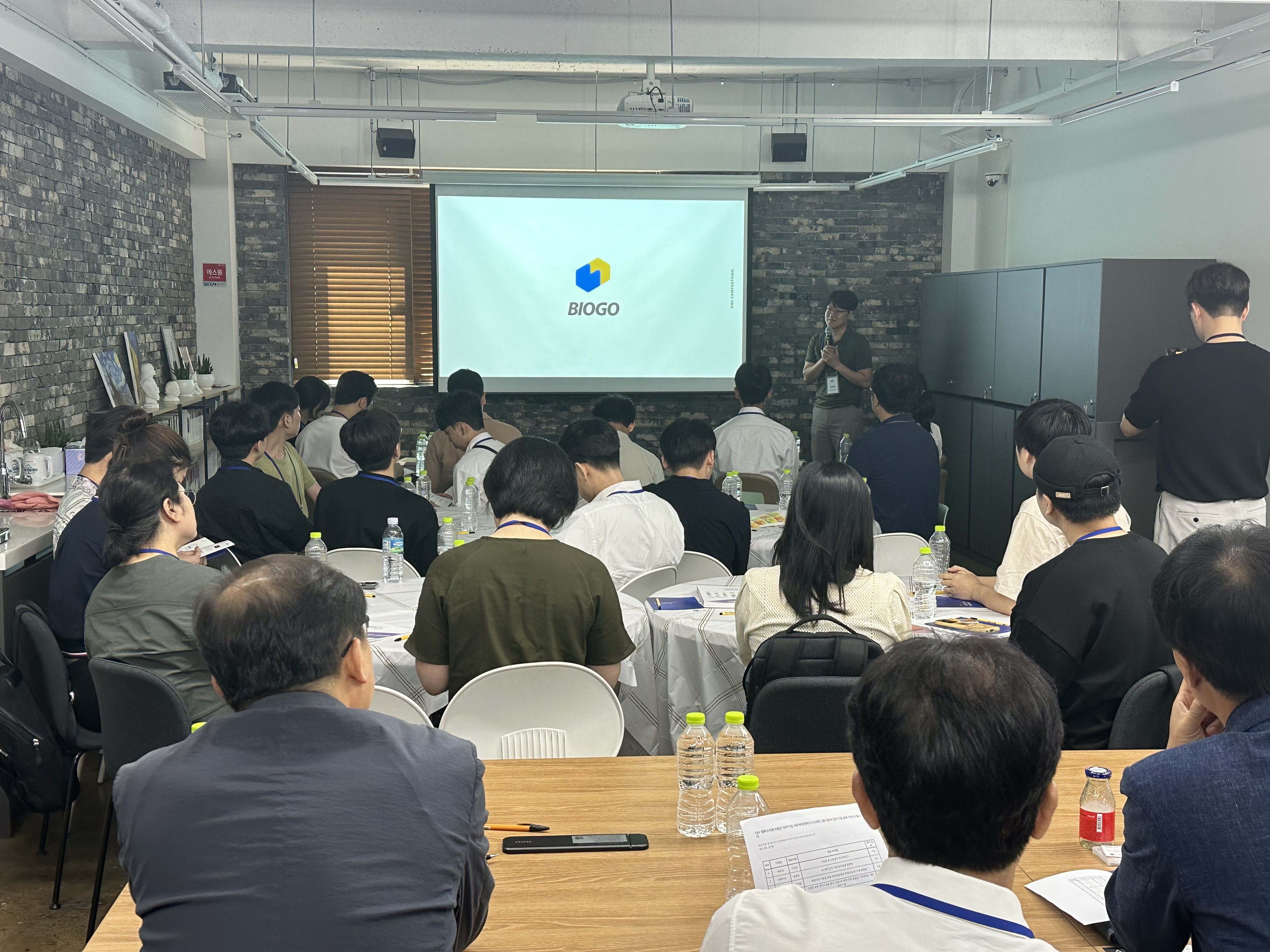
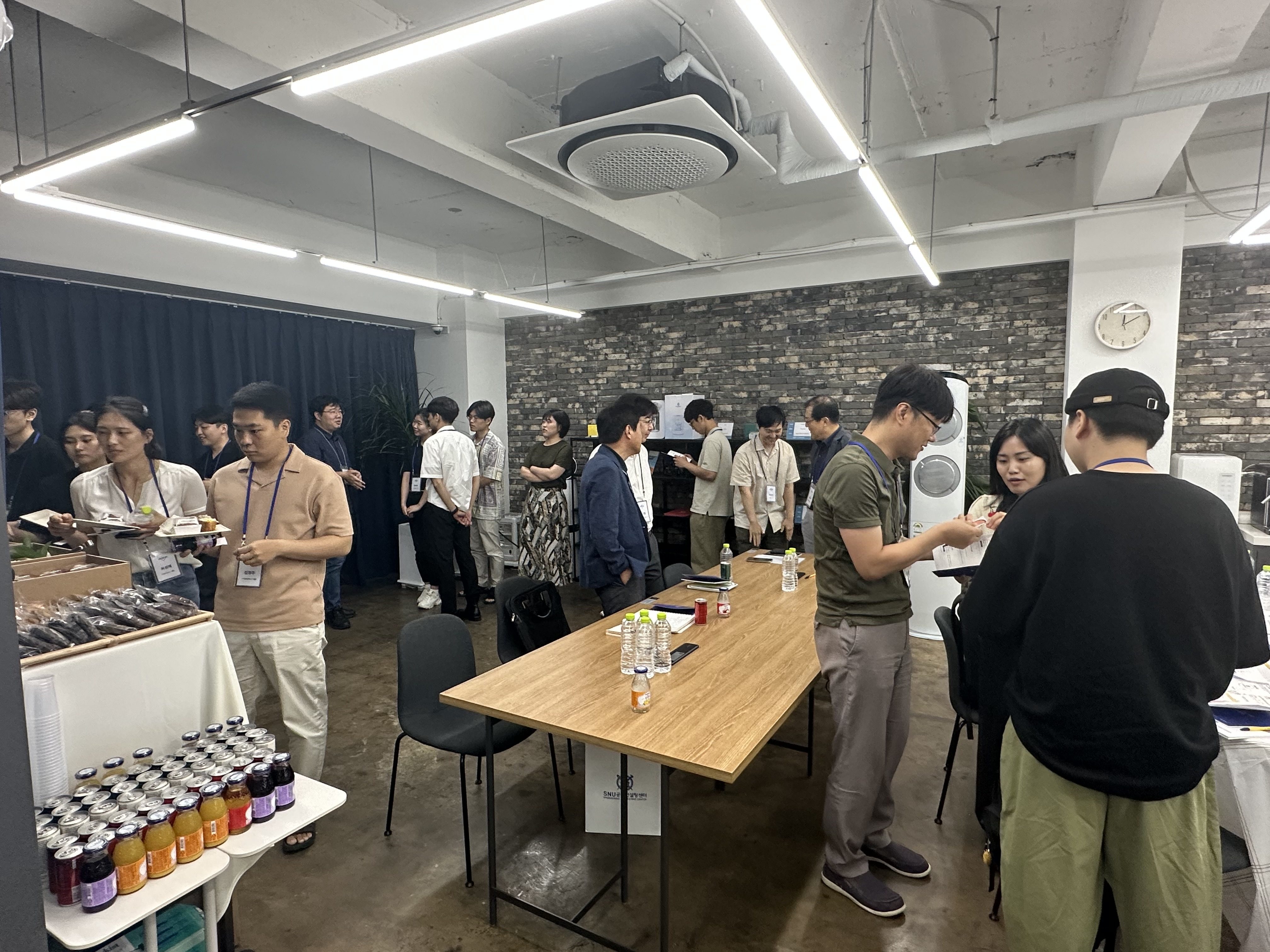
-
Notice"Mothers' Finding ...
 Dinoz (CEO Jeong Yoon-ji and Lee Ga-young), which runs the mobile app "Yugacrew," announced that it has expanded the operating area of the 1:1 childcare friend connection service "Jjak Crew" to Songpa-gu, Gangdong-gu, Gangnam-gu, and Gangseo-gu in Seoul. As a result, Parenting Crew's "Jjak Crew" service will be available throughout Seoul south of the Han River.
Yugacrew is a neighborhood-based O2O parenting community platform that connects mothers living nearby as friends. This year, the number of new users per month is increasing by an average of 45%, and 65% of mothers connected to the childcare crew app are leading to actual offline meetings.
"Jjak Crew," which is available free of charge on the "Yugacrew" app, is a 1:1 service that recommends the best child care partners based on the child care profile entered by the user. Using algorithms derived from about 4,000 data, it connects neighborhood parenting friends with well-matched residence, timing of childbirth, number of children, job status, and childcare interests. Since the launch of the app, the "Jjak Crew" service has been operated first in some areas of Seoul.
As a neighborhood-based childcare community, "Childcare Crew" has signed MOUs with Gwanak-gu, Yeongdeungpo-gu, and Seocho-gu Childcare Support Centers to cooperate in mutual promotion and plan various programs for childcare families. Our Neighborhood Parenting Group, where mothers and children under the age of 6 can participate together, can be applied on the childcare crew app.
"Today, when 90% of Korean mothers experience depression, mothers' parenting burdens and loneliness can be solved through solidarity and connection," said Jeong Yoon-ji, CEO of Dinoz. "We plan to quickly expand the childcare crew operation area to all areas of Seoul and major hub cities by the end of this year."
Dinoz, the operator of the mobile app "Yugacrew," attracted seed investment from Bon Angels Venture Partners in December last year, and was selected as the business team of the Chung Ju-young Startup Competition, H-On Dream Startup Ground Fellow, and AWS VC Spotlight in 2023.
Dinoz (CEO Jeong Yoon-ji and Lee Ga-young), which runs the mobile app "Yugacrew," announced that it has expanded the operating area of the 1:1 childcare friend connection service "Jjak Crew" to Songpa-gu, Gangdong-gu, Gangnam-gu, and Gangseo-gu in Seoul. As a result, Parenting Crew's "Jjak Crew" service will be available throughout Seoul south of the Han River.
Yugacrew is a neighborhood-based O2O parenting community platform that connects mothers living nearby as friends. This year, the number of new users per month is increasing by an average of 45%, and 65% of mothers connected to the childcare crew app are leading to actual offline meetings.
"Jjak Crew," which is available free of charge on the "Yugacrew" app, is a 1:1 service that recommends the best child care partners based on the child care profile entered by the user. Using algorithms derived from about 4,000 data, it connects neighborhood parenting friends with well-matched residence, timing of childbirth, number of children, job status, and childcare interests. Since the launch of the app, the "Jjak Crew" service has been operated first in some areas of Seoul.
As a neighborhood-based childcare community, "Childcare Crew" has signed MOUs with Gwanak-gu, Yeongdeungpo-gu, and Seocho-gu Childcare Support Centers to cooperate in mutual promotion and plan various programs for childcare families. Our Neighborhood Parenting Group, where mothers and children under the age of 6 can participate together, can be applied on the childcare crew app.
"Today, when 90% of Korean mothers experience depression, mothers' parenting burdens and loneliness can be solved through solidarity and connection," said Jeong Yoon-ji, CEO of Dinoz. "We plan to quickly expand the childcare crew operation area to all areas of Seoul and major hub cities by the end of this year."
Dinoz, the operator of the mobile app "Yugacrew," attracted seed investment from Bon Angels Venture Partners in December last year, and was selected as the business team of the Chung Ju-young Startup Competition, H-On Dream Startup Ground Fellow, and AWS VC Spotlight in 2023. -
NoticeAPGREEN's Developm...
 <Development of clean hydrogen production device based on low temperature plasma 'APGREEN'>
- Current Investment Attraction Phase: Seed
- Target amount of investment attraction: 500 million won
- When to attract investment: Q3 2023
- Since hydrogen mostly exists as a compound with water (H2O) or methane (CH4), a process of separating hydrogen is required to obtain hydrogen alone. A startup with new technology that produces hydrogen by reducing environmental pollution and reducing energy required in the process has decided to solve existing problems.
APGREEN is a startup that develops eco-friendly and economical hydrogen production and carbon processing devices based on hydrocarbons that can solve problems in existing hydrogen production such as energy input and carbon emission. AP Green minimizes input energy by utilizing exothermic reactions and low-temperature plasma to reduce energy consumed during hydrogen production. It uses low-temperature plasma to efficiently control exothermic reactions and increase energy efficiency to minimize energy consumption and improve economic feasibility. It also fundamentally suppresses carbon emission problems and solidifies carbon to facilitate processing, allowing carbon to be collected and treated in a stable and safe form.
APGREEN, selected for the 13th "Start-up NEST" of Big Bang Angels, is focusing on developing devices that reduce space and cost by simplifying hydrogen production processes and devices. It plans to reduce production costs and manpower input by developing a method of supplying packaged products to places where hydrogen production and production are needed without facility construction on the site.
<Development of clean hydrogen production device based on low temperature plasma 'APGREEN'>
- Current Investment Attraction Phase: Seed
- Target amount of investment attraction: 500 million won
- When to attract investment: Q3 2023
- Since hydrogen mostly exists as a compound with water (H2O) or methane (CH4), a process of separating hydrogen is required to obtain hydrogen alone. A startup with new technology that produces hydrogen by reducing environmental pollution and reducing energy required in the process has decided to solve existing problems.
APGREEN is a startup that develops eco-friendly and economical hydrogen production and carbon processing devices based on hydrocarbons that can solve problems in existing hydrogen production such as energy input and carbon emission. AP Green minimizes input energy by utilizing exothermic reactions and low-temperature plasma to reduce energy consumed during hydrogen production. It uses low-temperature plasma to efficiently control exothermic reactions and increase energy efficiency to minimize energy consumption and improve economic feasibility. It also fundamentally suppresses carbon emission problems and solidifies carbon to facilitate processing, allowing carbon to be collected and treated in a stable and safe form.
APGREEN, selected for the 13th "Start-up NEST" of Big Bang Angels, is focusing on developing devices that reduce space and cost by simplifying hydrogen production processes and devices. It plans to reduce production costs and manpower input by developing a method of supplying packaged products to places where hydrogen production and production are needed without facility construction on the site.
 CEO Tae-yoon Park
The goal is to supply production devices to the hydrogen production market, which is expected to grow to 200 trillion won in 26 years, based on technical advantages such as patents, applications, and trademarks that have secured intellectual property rights. The market for small and medium-sized hydrogen production devices targeted by APGREEN is expected to be more than 150 billion won in Korea and 1.5 trillion won worldwide.
APGREEN revealed the company's ultimate vision to "secure clean hydrogen source technology to contribute to energy security, contribute to carbon-neutral energy conversion through clean hydrogen production, and enhance Korea's energy self-sufficiency."
What is the problem that our team is trying to solve?
Hydrogen is the most common substance in the universe, but on Earth, it exists mostly as a compound like water (H2O) or methane (CH4), so hydrogen needs to be separated. This process consumes a lot of energy and carbon is released into the atmosphere. Therefore, the reality is that hydrogen made is clean, but expensive, and the process of making it is not clean yet, and it costs a lot.
So we're developing eco-friendly, economical hydrogen production and carbon processing devices based on hydrocarbons that can solve existing hydrogen production problems such as energy input and carbon emissions. Through this, we would like to contribute to the climate and energy crisis facing the Earth and our society by solving various problems that hydrogen production can cause, such as reducing air emissions of methane, the second-largest greenhouse gas, and saving energy/water.
How do we solve the problem?
The two biggest problems with hydrogen production are that it consumes a lot of energy to make it because it can only be used by hydrogen, and if hydrogen is made through hydrocarbons such as methane, it is not free from carbon emissions.
So, first, we minimize the energy input into hydrogen production by using exothermic reactions and low-temperature plasma to reduce the energy consumed in hydrogen production. Minimize energy consumption and improve economic efficiency by efficiently controlling exothermic reactions and increasing energy efficiency using low-temperature plasma.
Second, to solve the carbon emission problem, we applied technology that fundamentally suppresses carbon emissions and makes the generated carbon easier to process. It solidifies the carbon generated during hydrogen production and collects and processes it in a stable and safe form to manage it in a sustainable manner.
In addition, it simplifies processes and devices to reduce space and costs, and to save resources for hydrogen production, such as not using water during reforming reactions.
In this way, we want to build a sustainable and competitive hydrogen production system by improving the hydrogen production process, achieving the goals of minimizing carbon emissions, energy efficiency, minimizing footprint, improving economic efficiency, and reducing water consumption.
What is our competitive edge?
The key technology advantages include minimizing energy consumption required for hydrogen production through the effective fusion of various technologies such as low-temperature plasma technology, catalyst technology, and thermal reaction technology.
With these technological advantages, we are more competitive than our competitors in terms of mobility, ease of installation, operational efficiency, increased production capacity, clean hydrogen production and carbon utilization, and carbon negativity. Our technology provides an effective solution that minimizes maintenance costs such as catalysts and simplifies processes to realize economical and sustainable hydrogen production.
What products/services do we offer?
A clean hydrogen production system that produces and utilizes clean hydrogen where hydrocarbons can be supplied (natural gas, biomethane, etc.) can be converted into usable materials to minimize carbon emissions will be commercialized in a portable/onsite container type.
First of all, we will complete the prototype production of 20kg/day clean hydrothermal devices by 2024 and conduct market tests in 2025, and based on this, we will launch full-fledged commercial products of 500kg/day in 2026 and 1ton/day in 2027.
What market size and key customers are our products/services targeting?
The hydrogen production market is expected to reach about 200 trillion won by 2026, when we are preparing for full-fledged commercialization. Considering the prospect of hydrogen use and corporate/government investment plans, the small and medium-sized hydrogen production device market is expected to form at least 150 billion won in Korea and 1.5 trillion won worldwide.
Our products are aimed at various customers in the field of hydrogen production and utilization. In this way, we provide solutions to companies and institutions that need hydrogen suppliers for fuel cell power generation, hydrogen suppliers, factories and research facilities, hydrogen ESS operators, on-site hydrogen charging stations, biogas operators, and hydrogen production devices for ships and onboard. Our products have great potential and diversity in the hydrogen market and provide these diverse customers with efficient solutions for stable and sustainable hydrogen production and supply.
What is our business model?
Our business model is to develop and supply small and medium-sized modular clean hydrogen production devices. In other words, it is not a facility construction in the field, but a method of supplying packaged products where hydrogen production and production are needed. This model is easy to save time and money for consumers because it does not require on-site construction. Currently, the price of the 20kg/day market test product to be released around 2025 has been set at about 200 million won considering the small amount of production. If mass production is carried out in earnest in the future, the unit price will be reduced by 50%, which will be 500 million won for 100kg.day and 2.5 billion won for 500kg/day. This price range is similar to or lower than the price range of existing SMR devices without carbon capture, and we expect to secure sufficient price competitiveness in the future.
We can utilize the product for various hydrogen supply scenarios. For example, pure hydrogen can be supplied to fuel cells for 5kw buildings to supply hydrogen for power generation, and a reformer for fuel cells can support 10kw fuel cells. In addition, small and medium-sized on-site hydrogen charging stations can be operated to supply hydrogen for hydrogen fuel cell power mobility charging. In addition, laboratories and factories can provide stable and continuous on-site clean hydrogen production and supply to demand for pure hydrogen.
Through this, our business model is to realize stable and economical hydrogen supply by utilizing small and medium-sized clean hydrogen production devices in various hydrogen supply sectors.
CEO Tae-yoon Park
The goal is to supply production devices to the hydrogen production market, which is expected to grow to 200 trillion won in 26 years, based on technical advantages such as patents, applications, and trademarks that have secured intellectual property rights. The market for small and medium-sized hydrogen production devices targeted by APGREEN is expected to be more than 150 billion won in Korea and 1.5 trillion won worldwide.
APGREEN revealed the company's ultimate vision to "secure clean hydrogen source technology to contribute to energy security, contribute to carbon-neutral energy conversion through clean hydrogen production, and enhance Korea's energy self-sufficiency."
What is the problem that our team is trying to solve?
Hydrogen is the most common substance in the universe, but on Earth, it exists mostly as a compound like water (H2O) or methane (CH4), so hydrogen needs to be separated. This process consumes a lot of energy and carbon is released into the atmosphere. Therefore, the reality is that hydrogen made is clean, but expensive, and the process of making it is not clean yet, and it costs a lot.
So we're developing eco-friendly, economical hydrogen production and carbon processing devices based on hydrocarbons that can solve existing hydrogen production problems such as energy input and carbon emissions. Through this, we would like to contribute to the climate and energy crisis facing the Earth and our society by solving various problems that hydrogen production can cause, such as reducing air emissions of methane, the second-largest greenhouse gas, and saving energy/water.
How do we solve the problem?
The two biggest problems with hydrogen production are that it consumes a lot of energy to make it because it can only be used by hydrogen, and if hydrogen is made through hydrocarbons such as methane, it is not free from carbon emissions.
So, first, we minimize the energy input into hydrogen production by using exothermic reactions and low-temperature plasma to reduce the energy consumed in hydrogen production. Minimize energy consumption and improve economic efficiency by efficiently controlling exothermic reactions and increasing energy efficiency using low-temperature plasma.
Second, to solve the carbon emission problem, we applied technology that fundamentally suppresses carbon emissions and makes the generated carbon easier to process. It solidifies the carbon generated during hydrogen production and collects and processes it in a stable and safe form to manage it in a sustainable manner.
In addition, it simplifies processes and devices to reduce space and costs, and to save resources for hydrogen production, such as not using water during reforming reactions.
In this way, we want to build a sustainable and competitive hydrogen production system by improving the hydrogen production process, achieving the goals of minimizing carbon emissions, energy efficiency, minimizing footprint, improving economic efficiency, and reducing water consumption.
What is our competitive edge?
The key technology advantages include minimizing energy consumption required for hydrogen production through the effective fusion of various technologies such as low-temperature plasma technology, catalyst technology, and thermal reaction technology.
With these technological advantages, we are more competitive than our competitors in terms of mobility, ease of installation, operational efficiency, increased production capacity, clean hydrogen production and carbon utilization, and carbon negativity. Our technology provides an effective solution that minimizes maintenance costs such as catalysts and simplifies processes to realize economical and sustainable hydrogen production.
What products/services do we offer?
A clean hydrogen production system that produces and utilizes clean hydrogen where hydrocarbons can be supplied (natural gas, biomethane, etc.) can be converted into usable materials to minimize carbon emissions will be commercialized in a portable/onsite container type.
First of all, we will complete the prototype production of 20kg/day clean hydrothermal devices by 2024 and conduct market tests in 2025, and based on this, we will launch full-fledged commercial products of 500kg/day in 2026 and 1ton/day in 2027.
What market size and key customers are our products/services targeting?
The hydrogen production market is expected to reach about 200 trillion won by 2026, when we are preparing for full-fledged commercialization. Considering the prospect of hydrogen use and corporate/government investment plans, the small and medium-sized hydrogen production device market is expected to form at least 150 billion won in Korea and 1.5 trillion won worldwide.
Our products are aimed at various customers in the field of hydrogen production and utilization. In this way, we provide solutions to companies and institutions that need hydrogen suppliers for fuel cell power generation, hydrogen suppliers, factories and research facilities, hydrogen ESS operators, on-site hydrogen charging stations, biogas operators, and hydrogen production devices for ships and onboard. Our products have great potential and diversity in the hydrogen market and provide these diverse customers with efficient solutions for stable and sustainable hydrogen production and supply.
What is our business model?
Our business model is to develop and supply small and medium-sized modular clean hydrogen production devices. In other words, it is not a facility construction in the field, but a method of supplying packaged products where hydrogen production and production are needed. This model is easy to save time and money for consumers because it does not require on-site construction. Currently, the price of the 20kg/day market test product to be released around 2025 has been set at about 200 million won considering the small amount of production. If mass production is carried out in earnest in the future, the unit price will be reduced by 50%, which will be 500 million won for 100kg.day and 2.5 billion won for 500kg/day. This price range is similar to or lower than the price range of existing SMR devices without carbon capture, and we expect to secure sufficient price competitiveness in the future.
We can utilize the product for various hydrogen supply scenarios. For example, pure hydrogen can be supplied to fuel cells for 5kw buildings to supply hydrogen for power generation, and a reformer for fuel cells can support 10kw fuel cells. In addition, small and medium-sized on-site hydrogen charging stations can be operated to supply hydrogen for hydrogen fuel cell power mobility charging. In addition, laboratories and factories can provide stable and continuous on-site clean hydrogen production and supply to demand for pure hydrogen.
Through this, our business model is to realize stable and economical hydrogen supply by utilizing small and medium-sized clean hydrogen production devices in various hydrogen supply sectors.
 What is our team's achievement?
Through prior research and development tasks, we developed a low-temperature plasma-based reactor to build a commercialization foundation, which laid the foundation for laboratories, manpower pools, networks, basic equipment and materials. In addition, the miniaturization of the reactor has been achieved for ease of modularization, and scale-up know-how has been accumulated through continuous design-production-operation testing.
Our team established an IP portfolio by registering patents, applying for patents, and applying for trademarks to secure intellectual property rights. So far, we have registered three patents, one domestic patent and one U.S. patent.
We have completed the development of bench-scale technology through existing R&D, and are currently developing pilot-scale technology. Upon completion of the pilot scale technology development, we plan to develop and sell demonstration operations and commercial prototypes.
In addition, our team established a cooperative relationship with Professor Yoon Joon-yong of the Department of Mechanical Engineering at Hanyang University through MOU with Hyundai Corporation, and secured 200 million won in investment by attracting seed investment in December 2022. Through this, our team expects to achieve sales confirmation and good sales performance.
How competitive is our team?
Our team recognizes the urgency of securing the source technology of clean hydrogen production through experience in the hydrogen industry. CEO Park Tae-yoon joined a hydrogen company in 2017 and decided to start a business after discovering business opportunities for clean hydrogen production technology and devices. After that, we moved to the U.S. to discover items and started a business in Korea in January 2022. Our team's goal is to contribute to energy security by securing clean hydrogen source technology in Korea, contribute to carbon-neutral energy conversion through clean hydrogen production, and increase energy self-sufficiency in Korea.
Our team is composed of members with various experiences and expertise. As an early and founding member of the liquefied hydrogen company, CEO Park Tae-yoon has an understanding and start-up experience of the hydrogen industry that he learned in practice. Director Kim Bo-sung also has experience as a founding member of a hydrogen company and head of the research department. Ali T-Raissi, head of the institute, is a world-renowned hydrogen authority in the United States with more than 40 years of experience in hydrogen R&D.
Heo Jae-young, head of the research department, is a hydrogen expert who obtained a doctorate in mechanical engineering from the Korea Advanced Institute of Science and Technology (KAIST) and served as the head of the institute and the head of the research center for 28 years. In addition, the team includes senior researcher Lim Nam-hoon, researcher Lee Dong-yoon, and researcher Kim Na-yoon, who have high expertise and experience. Team members have a wide range of domestic and international experiences and expertise, and work together to develop and secure clean hydrogen production source technologies based on their roles and expertise.
Based on these various experiences and expertise, our team was formed together to contribute to the clean hydrogen industry in Korea. Our competitiveness is due to our experience and understanding in the hydrogen industry, our experience in starting a business, and our strong capabilities in developing clean hydrogen production source technologies. Through this, we are striving to contribute to the transition of energy security and carbon neutrality in the Republic of Korea and to achieve the goal of increasing energy self-sufficiency.
Why we need to be invested!!
First, we have secured the source technology of clean hydrogen production, and through this, we have developed a low-temperature plasma-based reactor and realized the miniaturization of the reactor. We have patents, applications, trademarks, etc. that have secured intellectual property rights, and we have secured technological advantage through this. Through investment, we can further develop our technology and proceed with further development and product improvement for commercialization.
Second, hydrogen plays an important role in the field of renewable energy, and the growth of the global hydrogen economy is accelerating. We can enter the hydrogen market through clean hydrogen production devices and utilize products for various hydrogen supply scenarios. This has great potential in this era when the need for energy transformation and the importance of responding to climate change are recognized, and investment can strengthen its competitiveness in this market.
Third, our team already has experience in building a foundation and developing bench-scale technology through prior R&D tasks. In addition, we have a network that can receive cooperative relationships and funding through the signing of MOUs and attracting seed investment. By receiving investment, we can proceed with demonstration operation, product development, sales, etc. for successful technology development and commercialization, and further strengthen our partnership to grow.
Source: https://wowtale.net/2023/07/26/60948/
What is our team's achievement?
Through prior research and development tasks, we developed a low-temperature plasma-based reactor to build a commercialization foundation, which laid the foundation for laboratories, manpower pools, networks, basic equipment and materials. In addition, the miniaturization of the reactor has been achieved for ease of modularization, and scale-up know-how has been accumulated through continuous design-production-operation testing.
Our team established an IP portfolio by registering patents, applying for patents, and applying for trademarks to secure intellectual property rights. So far, we have registered three patents, one domestic patent and one U.S. patent.
We have completed the development of bench-scale technology through existing R&D, and are currently developing pilot-scale technology. Upon completion of the pilot scale technology development, we plan to develop and sell demonstration operations and commercial prototypes.
In addition, our team established a cooperative relationship with Professor Yoon Joon-yong of the Department of Mechanical Engineering at Hanyang University through MOU with Hyundai Corporation, and secured 200 million won in investment by attracting seed investment in December 2022. Through this, our team expects to achieve sales confirmation and good sales performance.
How competitive is our team?
Our team recognizes the urgency of securing the source technology of clean hydrogen production through experience in the hydrogen industry. CEO Park Tae-yoon joined a hydrogen company in 2017 and decided to start a business after discovering business opportunities for clean hydrogen production technology and devices. After that, we moved to the U.S. to discover items and started a business in Korea in January 2022. Our team's goal is to contribute to energy security by securing clean hydrogen source technology in Korea, contribute to carbon-neutral energy conversion through clean hydrogen production, and increase energy self-sufficiency in Korea.
Our team is composed of members with various experiences and expertise. As an early and founding member of the liquefied hydrogen company, CEO Park Tae-yoon has an understanding and start-up experience of the hydrogen industry that he learned in practice. Director Kim Bo-sung also has experience as a founding member of a hydrogen company and head of the research department. Ali T-Raissi, head of the institute, is a world-renowned hydrogen authority in the United States with more than 40 years of experience in hydrogen R&D.
Heo Jae-young, head of the research department, is a hydrogen expert who obtained a doctorate in mechanical engineering from the Korea Advanced Institute of Science and Technology (KAIST) and served as the head of the institute and the head of the research center for 28 years. In addition, the team includes senior researcher Lim Nam-hoon, researcher Lee Dong-yoon, and researcher Kim Na-yoon, who have high expertise and experience. Team members have a wide range of domestic and international experiences and expertise, and work together to develop and secure clean hydrogen production source technologies based on their roles and expertise.
Based on these various experiences and expertise, our team was formed together to contribute to the clean hydrogen industry in Korea. Our competitiveness is due to our experience and understanding in the hydrogen industry, our experience in starting a business, and our strong capabilities in developing clean hydrogen production source technologies. Through this, we are striving to contribute to the transition of energy security and carbon neutrality in the Republic of Korea and to achieve the goal of increasing energy self-sufficiency.
Why we need to be invested!!
First, we have secured the source technology of clean hydrogen production, and through this, we have developed a low-temperature plasma-based reactor and realized the miniaturization of the reactor. We have patents, applications, trademarks, etc. that have secured intellectual property rights, and we have secured technological advantage through this. Through investment, we can further develop our technology and proceed with further development and product improvement for commercialization.
Second, hydrogen plays an important role in the field of renewable energy, and the growth of the global hydrogen economy is accelerating. We can enter the hydrogen market through clean hydrogen production devices and utilize products for various hydrogen supply scenarios. This has great potential in this era when the need for energy transformation and the importance of responding to climate change are recognized, and investment can strengthen its competitiveness in this market.
Third, our team already has experience in building a foundation and developing bench-scale technology through prior R&D tasks. In addition, we have a network that can receive cooperative relationships and funding through the signing of MOUs and attracting seed investment. By receiving investment, we can proceed with demonstration operation, product development, sales, etc. for successful technology development and commercialization, and further strengthen our partnership to grow.
Source: https://wowtale.net/2023/07/26/60948/ -
NoticeAniai is also targ...
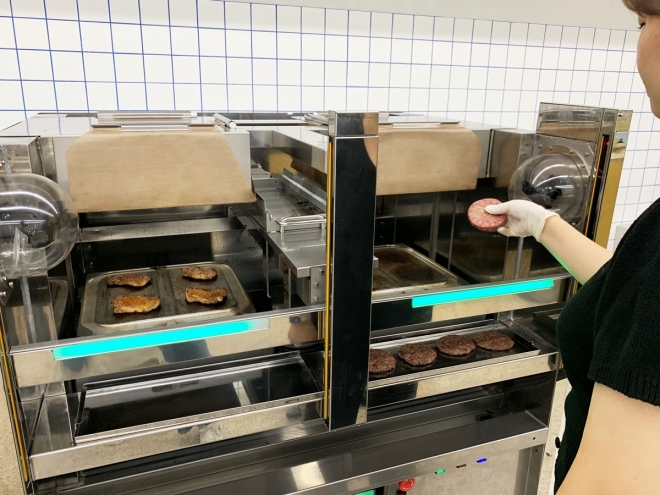 Aniai is also targeting the 'chicken burger' market...You can cook beef and chicken at the same time
Robot kitchen startup Aniai is planning to target the chicken burger market with high cooking difficulties by upgrading the pressing technology of the hamburger robot "Alpha Grill." You can cook beef patties and chicken patties at the same time.
Aniai, who succeeded in commercializing a hamburger cooking robot for the first time in Korea, said on the 26th, "At the hamburger store that introduced Alpha Grill through the upgrade, you can cook not only beef patties but also chicken patties made of whole flesh." Since early this year, Aniai has been preparing to upgrade its products to expand its cooking menu by launching its RaaS (Service Subscription Robot) business in earnest.
Aniai improved the compressive strength of the "alpha grill" that is baked by pressing patties on both sides by 300% compared to the previous one, and improved the compressive precision to less than 1mm through software upgrade. In addition, the company explained that it optimized the control algorithm to control the speed and acceleration of the cooking robot motor, and to maintain the shape and texture of the chicken even under strong compression.
Chicken patties that use whole meat are not uniform in thickness compared to beef patties that use minced meat, so cooking is difficult. In order to cook the inside without burning the outside, it is necessary to apply constant heat at a pressure that does not break the chicken flesh. The control algorithm used for this provides the optimal environment necessary for cooking amorphous chicken patties.
With the upgrade of Alpha Grill, Aniai will target domestic and foreign restaurant companies that sell chicken burger menus such as fast food and casual dining restaurants. The domestic hamburger market is growing at 5 trillion won, and more and more places are offering chicken burgers as their main menu to target diverse consumers' tastes. In the United States, most hamburger stores sell burgers made of chicken, and the market's No. 1 chicken sandwich brand operates more than 2,950 stores in the United States.
"We were able to confirm the market demand for chicken patty cooking robots by meeting domestic and foreign customers," said Hwang Gun-pil, CEO of Aniai. "We will strengthen our product competitiveness to target new markets through continuous R&D investment."
Source: https://www.seoul.co.kr/news/newsView.php?id=20230726500026&wlog_tag3=naver
Aniai is also targeting the 'chicken burger' market...You can cook beef and chicken at the same time
Robot kitchen startup Aniai is planning to target the chicken burger market with high cooking difficulties by upgrading the pressing technology of the hamburger robot "Alpha Grill." You can cook beef patties and chicken patties at the same time.
Aniai, who succeeded in commercializing a hamburger cooking robot for the first time in Korea, said on the 26th, "At the hamburger store that introduced Alpha Grill through the upgrade, you can cook not only beef patties but also chicken patties made of whole flesh." Since early this year, Aniai has been preparing to upgrade its products to expand its cooking menu by launching its RaaS (Service Subscription Robot) business in earnest.
Aniai improved the compressive strength of the "alpha grill" that is baked by pressing patties on both sides by 300% compared to the previous one, and improved the compressive precision to less than 1mm through software upgrade. In addition, the company explained that it optimized the control algorithm to control the speed and acceleration of the cooking robot motor, and to maintain the shape and texture of the chicken even under strong compression.
Chicken patties that use whole meat are not uniform in thickness compared to beef patties that use minced meat, so cooking is difficult. In order to cook the inside without burning the outside, it is necessary to apply constant heat at a pressure that does not break the chicken flesh. The control algorithm used for this provides the optimal environment necessary for cooking amorphous chicken patties.
With the upgrade of Alpha Grill, Aniai will target domestic and foreign restaurant companies that sell chicken burger menus such as fast food and casual dining restaurants. The domestic hamburger market is growing at 5 trillion won, and more and more places are offering chicken burgers as their main menu to target diverse consumers' tastes. In the United States, most hamburger stores sell burgers made of chicken, and the market's No. 1 chicken sandwich brand operates more than 2,950 stores in the United States.
"We were able to confirm the market demand for chicken patty cooking robots by meeting domestic and foreign customers," said Hwang Gun-pil, CEO of Aniai. "We will strengthen our product competitiveness to target new markets through continuous R&D investment."
Source: https://www.seoul.co.kr/news/newsView.php?id=20230726500026&wlog_tag3=naver -
NoticePet Genetic Testin...
 Pettech startup 'Peterpetter'(CEO Park Jun-ho), which operates a pet genetic testing service, has been finally selected for the Tips program of the Ministry of SMEs and Startups.
TIPS (Tech Incubator Program for Startup) is a "private investment-led technology start-up support" program that intensively fosters start-up teams with technology items to lead the global market. Peterpetter, founded in June 2020, is a pet healthcare startup that provides customized health care guides to pets based on genetic testing, and has attracted investment in Free A this month.
Peterpetter's selection of tips was pushed by MY Social Company. Peterpetter was highly praised for the development of new inspection methods that solve existing problems, the specificity that there is no alternative technology, and the business feasibility in the pet industry. Through this selection of tips, the company plans to focus on developing new test solutions that can help pet health care and upgrading its business.
Peterpetter operates genetic testing services "Cattering" and "Dogma" for the health care of pets. It is a non-face-to-face home care service developed by researchers and veterinarians from Seoul National University, and guardians can easily collect and test the genes of pets at home by purchasing kits online. Through the test, you can receive a result report including the risk of developing genetic diseases in naturally born pets and a health care guide. Peterpetter's service can be tested for multiple genetic diseases at once, and can enjoy up to 94% cost savings compared to other testing institutions.
Peterpetter, which marks its third year this year, is achieving sales growth of more than 300% every year. Starting with the selection of childcare companies at the Jeju Creative Economy Innovation Center, Seoul National University Campus Town, and Jeju Free International City Development Center (JDC) Route 330, it has been selected as a representative healthcare company.
Peterpetter CEO Park Jun-ho said, "We will promote research and development and commercialization of new services through the selection of this TIPS program, and upgrade the service using pet genetic data."
Kang Shin-il, vice president of MY Social Company, said, "Peter Peter is a startup that can commercialize high-quality R&D at the same time," adding, "We will actively support technology commercialization through resource linkage of operators during the Tip business period."
Pettech startup 'Peterpetter'(CEO Park Jun-ho), which operates a pet genetic testing service, has been finally selected for the Tips program of the Ministry of SMEs and Startups.
TIPS (Tech Incubator Program for Startup) is a "private investment-led technology start-up support" program that intensively fosters start-up teams with technology items to lead the global market. Peterpetter, founded in June 2020, is a pet healthcare startup that provides customized health care guides to pets based on genetic testing, and has attracted investment in Free A this month.
Peterpetter's selection of tips was pushed by MY Social Company. Peterpetter was highly praised for the development of new inspection methods that solve existing problems, the specificity that there is no alternative technology, and the business feasibility in the pet industry. Through this selection of tips, the company plans to focus on developing new test solutions that can help pet health care and upgrading its business.
Peterpetter operates genetic testing services "Cattering" and "Dogma" for the health care of pets. It is a non-face-to-face home care service developed by researchers and veterinarians from Seoul National University, and guardians can easily collect and test the genes of pets at home by purchasing kits online. Through the test, you can receive a result report including the risk of developing genetic diseases in naturally born pets and a health care guide. Peterpetter's service can be tested for multiple genetic diseases at once, and can enjoy up to 94% cost savings compared to other testing institutions.
Peterpetter, which marks its third year this year, is achieving sales growth of more than 300% every year. Starting with the selection of childcare companies at the Jeju Creative Economy Innovation Center, Seoul National University Campus Town, and Jeju Free International City Development Center (JDC) Route 330, it has been selected as a representative healthcare company.
Peterpetter CEO Park Jun-ho said, "We will promote research and development and commercialization of new services through the selection of this TIPS program, and upgrade the service using pet genetic data."
Kang Shin-il, vice president of MY Social Company, said, "Peter Peter is a startup that can commercialize high-quality R&D at the same time," adding, "We will actively support technology commercialization through resource linkage of operators during the Tip business period." -
Notice"It's a cold spell...<Lee Min-gu, Cleveland Avenue Management Partner, gived Special Lecture at Seoul National University Campus Town > "Raise value and volume, reduce costs" (Value Up, Volume Up, Cost Down) Lee Min-gu, a managing partner of Cleveland Avenue, recently visited Korea, gave such advice to domestic startups during the cold season of investment. Cleveland Avenue is a leading venture capital (VC) based in the United States and investing in lifestyle brands and technology companies that have a positive impact on the market. CEO Lee is leading the company's Tech Fund investment in innovative technology fields such as artificial intelligence (AI), digital experience (DX), and robotics. To get investment in the United States? In a special lecture titled "Strategy to Enter the US Venture Ecosystem Market and Attract Investment" held at Seoul National University on the 18th, CEO Lee said, "In order to receive investment in the US, we need to know the characteristics of US investment." He advised that since the U.S. VC industry is usually specialized for each item, it is necessary to meet VCs suitable for the field. Lee said, "The most important thing at this time is the potential growth of business items," adding, "The role of venture capital aims to provide more than 300% of high returns after collecting investment from investors, so if business items are not growthable, we do not invest." It is also necessary to present a blueprint for Exit with an eye on the investor's perspective. Lee explained, "This explanation is helpful from the VC's point of view because it is predictable whether investors can leave promised profits by knowing when to extract." He added, "It is also important to make efforts to reduce costs while increasing the value and sales that companies provide to the market."
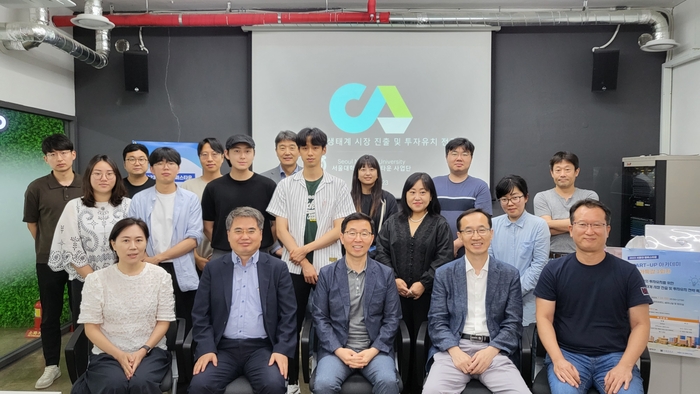 The most important 'trust' to receive investment
Lee advised, "We should build trust by continuously contacting investors diligently and diligently." They say that if investors' trust builds up, there will be a kind of "human network effect" that introduces investors in the field even if they are not directly related to them.
Lee said, "If you want to find VC contacts, you can find them all," adding, "Especially in the U.S. VC industry, we share (industry) contacts and e-mails across the U.S., so if you establish a relationship with one VC, you can connect related investors through it."
Meanwhile, Lee's special lecture was held at the invitation of the Seoul National University Campus Town Project Group for Gwanak S Valley, Seoul National University Campus Town tenant companies, and Seoul National University members.
"I hope this special lecture will serve as an opportunity for many excellent companies in Gwanak-gu to be born as unicorns," said Kim Tae-wan, head of the Campus Town Project Group at Seoul National University.
The most important 'trust' to receive investment
Lee advised, "We should build trust by continuously contacting investors diligently and diligently." They say that if investors' trust builds up, there will be a kind of "human network effect" that introduces investors in the field even if they are not directly related to them.
Lee said, "If you want to find VC contacts, you can find them all," adding, "Especially in the U.S. VC industry, we share (industry) contacts and e-mails across the U.S., so if you establish a relationship with one VC, you can connect related investors through it."
Meanwhile, Lee's special lecture was held at the invitation of the Seoul National University Campus Town Project Group for Gwanak S Valley, Seoul National University Campus Town tenant companies, and Seoul National University members.
"I hope this special lecture will serve as an opportunity for many excellent companies in Gwanak-gu to be born as unicorns," said Kim Tae-wan, head of the Campus Town Project Group at Seoul National University. -
NoticeKorea's first 'NOI...
 NOI LAB (CEO Hwang Byung-hoon), a company that analyzes judgment and cognitive skills for the first time in Korea, announced on the 5th that it has signed a memorandum of understanding (MOU) with the soccer team Football A. This MOU was signed to provide NOI LAB's "NOISCAL" ability analysis and improvement services to Football A's sports players.
NOI LAB is a technology-based medical startup that trains and analyzes the brain through NeuLab's own devices and curriculum. In particular, NOI LAB's cerebral program, which is divided into three stages of vision, judgment, and agility, develops cognitive skills through the anterior frontal lobe stimulation curriculum, and AI analyzes user data to derive super-personalized analysis results and provide reports.
Brain physical is a compound word of physical and brain, which means physical ability, and its importance is growing in modern sports, where players' cognitive abilities such as judgment and agility are becoming new evaluation indicators.
Football A is a soccer club team for K-League coaches to introduce cutting-edge science and technology to foster promising players. Football A coach Hwang Jin-sung said, "We introduced NOI LAB's brain physical program because we felt the players needed cognitive analysis and training."
NOI LAB is a technology-based startup that has been recognized for its potential by being selected as the "2023 Non-face-to-face Startup Promotion Project" since its establishment in November last year. It has been carrying out a number of patent applications and thesis publications and has gained expertise, and is expanding the scope of cooperation with various sports clubs.
CEO Hwang Byung-hoon said, "Recently, many people have become accustomed to stimulating content and have poor brain function, but they tend to neglect it because it is invisible."
He also said, "The importance of sports players' cognitive abilities is increasing overseas, but in Korea, many young people often overwork their bodies in the process of becoming professional athletes," adding, "We will try to change the training process of domestic youth more scientifically and efficiently."
NOI LAB (CEO Hwang Byung-hoon), a company that analyzes judgment and cognitive skills for the first time in Korea, announced on the 5th that it has signed a memorandum of understanding (MOU) with the soccer team Football A. This MOU was signed to provide NOI LAB's "NOISCAL" ability analysis and improvement services to Football A's sports players.
NOI LAB is a technology-based medical startup that trains and analyzes the brain through NeuLab's own devices and curriculum. In particular, NOI LAB's cerebral program, which is divided into three stages of vision, judgment, and agility, develops cognitive skills through the anterior frontal lobe stimulation curriculum, and AI analyzes user data to derive super-personalized analysis results and provide reports.
Brain physical is a compound word of physical and brain, which means physical ability, and its importance is growing in modern sports, where players' cognitive abilities such as judgment and agility are becoming new evaluation indicators.
Football A is a soccer club team for K-League coaches to introduce cutting-edge science and technology to foster promising players. Football A coach Hwang Jin-sung said, "We introduced NOI LAB's brain physical program because we felt the players needed cognitive analysis and training."
NOI LAB is a technology-based startup that has been recognized for its potential by being selected as the "2023 Non-face-to-face Startup Promotion Project" since its establishment in November last year. It has been carrying out a number of patent applications and thesis publications and has gained expertise, and is expanding the scope of cooperation with various sports clubs.
CEO Hwang Byung-hoon said, "Recently, many people have become accustomed to stimulating content and have poor brain function, but they tend to neglect it because it is invisible."
He also said, "The importance of sports players' cognitive abilities is increasing overseas, but in Korea, many young people often overwork their bodies in the process of becoming professional athletes," adding, "We will try to change the training process of domestic youth more scientifically and efficiently."
 <During NOI LAB's judgment training, decision-making training produced through algorithms is conducted. This can improve both the judgment and reaction time of the players.>
<During NOI LAB's judgment training, decision-making training produced through algorithms is conducted. This can improve both the judgment and reaction time of the players.> -
NoticeMacrogen-Crypto La...
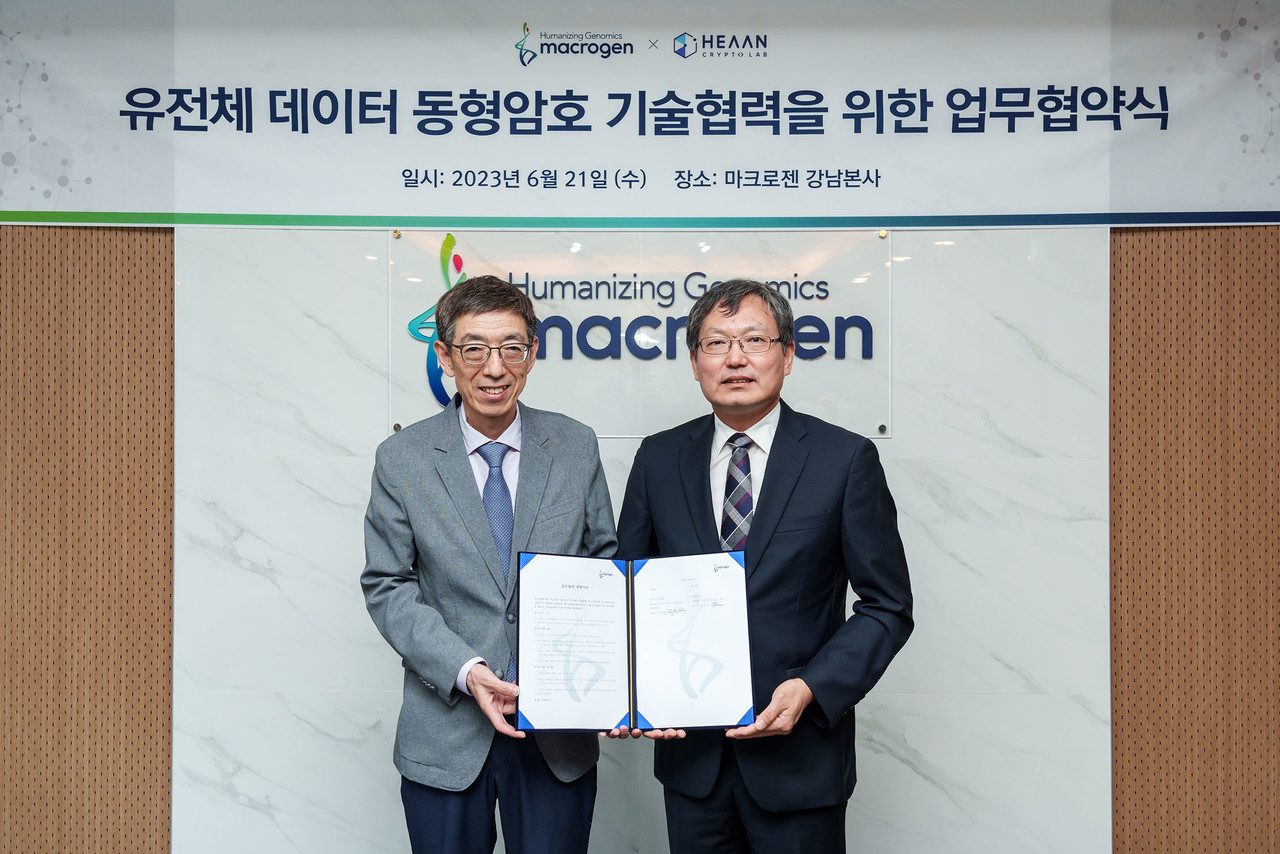 Macrogen announced on the 22nd that it held a business agreement ceremony with CryptoLab, a startup of homomorphic encryption technology, to cooperate with genomic data homomorphic encryption technology.
Macrogen conducts technical education and joint research to expand the application of genomic data analysis services of CryptoLab and homomorphic cryptography technology, and continues cooperation to share and demonstrate services as a result of technology application. Based on this cooperation, Macrogen plans to expand and apply homomorphic encryption technology to all areas of the service, starting with multiple gene risk score (PRS) analysis that predicts diseases through genetic testing.
Jung Hee Cheon, CEO of Crypto Lab, said, "Isomorphic encryption technology will bring great innovation to the medical, bio, and healthcare industries, where privacy is particularly important."
Source: Maeil Ilbo (http://www.m-i.kr )
Macrogen announced on the 22nd that it held a business agreement ceremony with CryptoLab, a startup of homomorphic encryption technology, to cooperate with genomic data homomorphic encryption technology.
Macrogen conducts technical education and joint research to expand the application of genomic data analysis services of CryptoLab and homomorphic cryptography technology, and continues cooperation to share and demonstrate services as a result of technology application. Based on this cooperation, Macrogen plans to expand and apply homomorphic encryption technology to all areas of the service, starting with multiple gene risk score (PRS) analysis that predicts diseases through genetic testing.
Jung Hee Cheon, CEO of Crypto Lab, said, "Isomorphic encryption technology will bring great innovation to the medical, bio, and healthcare industries, where privacy is particularly important."
Source: Maeil Ilbo (http://www.m-i.kr ) -
NoticeUlsan Free Economi...
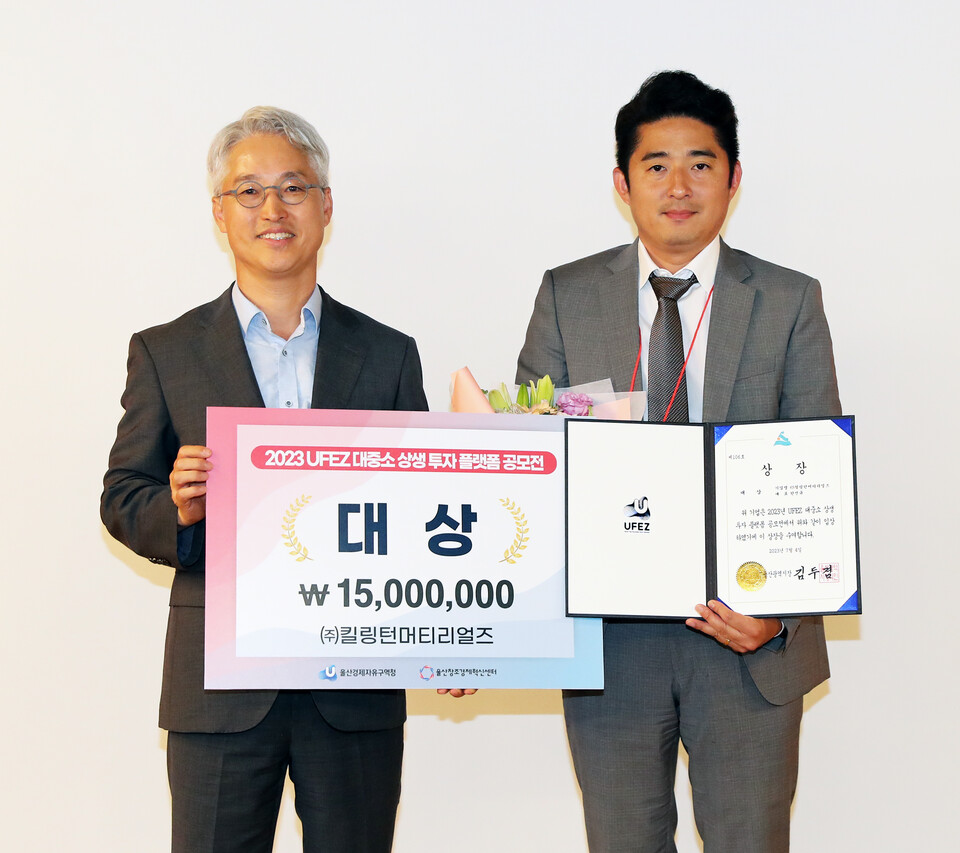 The Ulsan Free Economic Zone Authority held the 2023 Ulsan Free Economic Zone (UFEZ) Win-Win Investment-Based Contest Award Ceremony at the Creative Economy Innovation Center in the afternoon of the 4th.
Through this contest, 40 promising companies in UFEZ's core strategic industries (hydrogen, low-carbon energy, future means of transportation, and future chemical materials) were discovered, and local conglomerates and public institutions participated in the evaluation to select eight excellent companies. Killington Materials Co., Ltd., which has low-cost and high-efficiency manufacturing technology of special graphite MCMB (the next-generation carbon anode material needed to improve the performance of lithium secondary batteries), won the grand prize.
source : ulsanpress (https://www.ulsanpress.net)
The Ulsan Free Economic Zone Authority held the 2023 Ulsan Free Economic Zone (UFEZ) Win-Win Investment-Based Contest Award Ceremony at the Creative Economy Innovation Center in the afternoon of the 4th.
Through this contest, 40 promising companies in UFEZ's core strategic industries (hydrogen, low-carbon energy, future means of transportation, and future chemical materials) were discovered, and local conglomerates and public institutions participated in the evaluation to select eight excellent companies. Killington Materials Co., Ltd., which has low-cost and high-efficiency manufacturing technology of special graphite MCMB (the next-generation carbon anode material needed to improve the performance of lithium secondary batteries), won the grand prize.
source : ulsanpress (https://www.ulsanpress.net)
News
Check the activities of Seoul National University Campus Town Project Center and participating companies.
